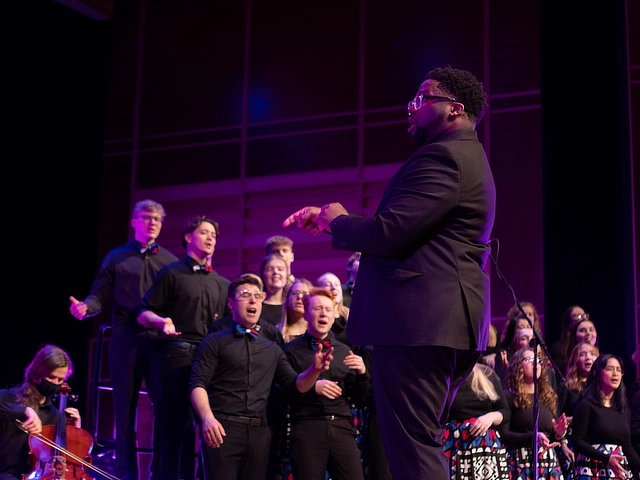
Gospel music unites people in a way that spoken words do not. From work songs to spirituals, hymns, and more, the history and origin of this music is so rich that, for many generations, it has helped African Americans endure hardship and has given them the strength to overcome.
Gospel music is set apart from other music genres because of its message. The word “gospel” refers to the good news that Jesus lives. Hope is what this music is centered around. The lyrics come from scripture, and singing is added to tell biblical stories and share the beauty of God’s faithfulness.
Traditionally, percussive instruments, drums, and chants were used by Africans for many reasons. The most common use for percussion was for communication. This form of communication was adapted to the spirituals. Another form of communicating was the “call and response” style of singing, which evolved in the early 17th century, by the enslaved. Work songs and sacred songs were often repeated in a simple yet singable fashion. These songs were closely connected to a form of work and sung while conducting field tasks.
So, how did the enslaved know what to do and where to go without phones, maps, or the internet? How did they know what to communicate hundreds of miles away without the ability to read or write? Music (and a whole lot of faith) are the answers to those questions. The enslaved created songs with coded messages to convey how to travel north. Many of the lyrics gave directions on how to escape, while others gave detailed warnings of the danger ahead. These rich oral traditional African American folk songs were written with hope as the foundation and are still being sung and continue influencing American music today.
Swing low, sweet chariot,
Coming for to carry me home,
Swing low, sweet chariot,
Coming for to carry me home.
I looked over at Jordan, and what did I see,
Coming for to carry me home,
A band of angels coming after me,
Coming for to carry me home.
If the enslaved heard this melody, they knew it was time to escape. The band of angels referred to the leaders of the Underground Railroad. The “sweet chariot” would soon come south (swing low) to guide the enslaved people north to freedom (carry me home).
Wade in the Water. God’s gonna trouble the water.
Who are those children all dressed in Red?
God’s gonna trouble the water.
Must be the ones that Moses led.
God’s gonna trouble the water.
These lyrics were used to tell the enslaved people how to avoid being captured by their masters. If they felt like they needed to hide, they were instructed, through the song, to dip themselves (wade) in the water, as it would remove their scent from their clothes so the dogs would not be able to smell them.
Not only has the message of hope in this music helped enslaved people escape to freedom, but I believe it inspired them to keep hope alive. They were consistent, perseverant, and intelligent individuals that influenced and inspired many generations after them. What I love most about the stories of those who escaped is how they spread that same hope to others by going back to free more of the enslaved. This music has inspired millions around the world. It has been comforting and a blanket of peace for those in need. Many lives have been guided by the inspirational message of gospel music. For many, it has fulfilled a personal search for God. Let’s fast forward to today.
You may wonder, is this even significant today? How could all this talk about the past be relevant in the present? The message in this music has built bridges with many different races, cultural backgrounds, denominational experiences, and more. Gospel music, and its significance, has reached the world. It started as slave music but became a powerful movement that still inspires the lives of many around the globe. Gospel music builds societal bridges and offers messages of hope, not just for the people who created this music but for everyone who listens to it today, so if you don’t know, now, you know! This music has an incredible way of bringing light to dark spaces, lifting heavy burdens, and testifying of God’s goodness. Nate Glasper is a Resource Development Specialist and Campus Worship Associate at the Calvin Institute of Christian Worship. He is currently the director of the Calvin University Gospel Choir, while also serving as Worship Pastor for Grace for the Nations Church in Grand Rapids. As a worship leader and recording artist, Nate has traveled for events in the USA and abroad such as Haiti, Guatemala, South Korea, and South Africa. Nate is the founder and coordinator of Camp Judah, a worship camp for youth and teens desiring to grow as young worship leaders and songwriters. His goal is to train and equip the next generation of worship leaders.
Nate Glasper is a Resource Development Specialist and Campus Worship Associate at the Calvin Institute of Christian Worship. He is currently the director of the Calvin University Gospel Choir, while also serving as Worship Pastor for Grace for the Nations Church in Grand Rapids. As a worship leader and recording artist, Nate has traveled for events in the USA and abroad such as Haiti, Guatemala, South Korea, and South Africa. Nate is the founder and coordinator of Camp Judah, a worship camp for youth and teens desiring to grow as young worship leaders and songwriters. His goal is to train and equip the next generation of worship leaders.
We invite you to join us for Animate 2024! By registering for Animate, you will have the chance to choose an artistic track that sparks your interest and select from a variety of toolbox classes. Our exceptional Samford Faculty, as well as guest artists who are experts in their respective fields, will be your instructors. The toolbox classes for 2024 include “Rehearsing and Leading a Band” and “Biblical Worship,” taught by the author of this post and Animate 2024 Worship Leader, Nate Glasper.
For additional reading, check-out How Poetry Helps us Dwell in Difficulty by Samford Assistant English Professor, and 2024 Animate poetry toolbox instructor, Olivia Milroy Evans.
